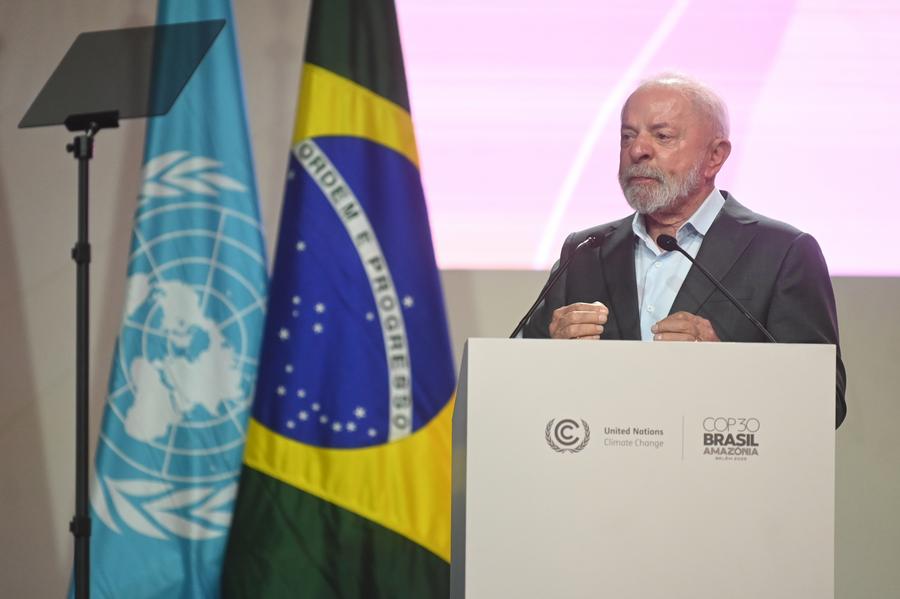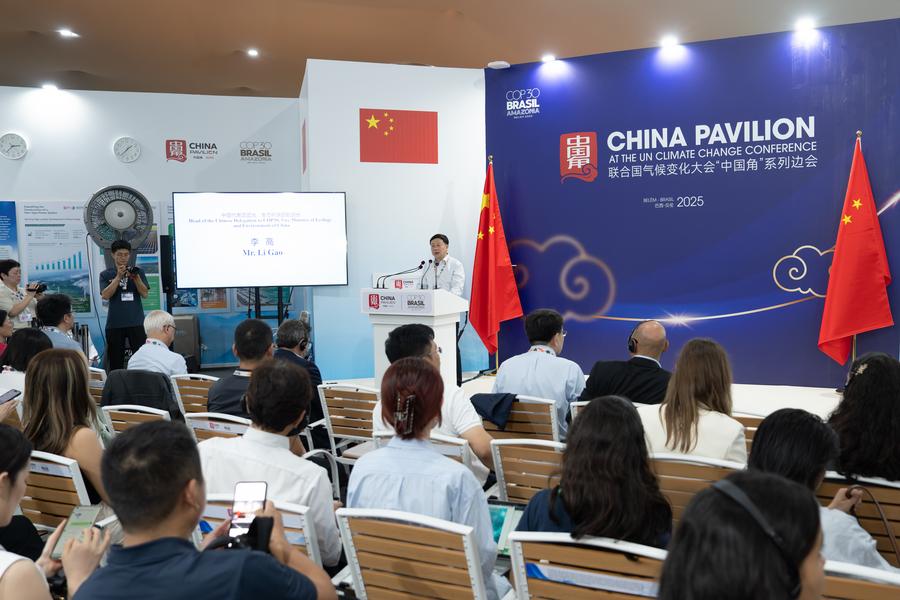The ongoing 30th UN Climate Change Conference (COP30), which kicked off in Brazil's Amazonian city of Belem on Monday, marks another landmark in improving global climate governance in a just and equitable manner.
COP30, which runs through Nov. 21, brings together representatives from nearly 200 countries and regions to focus on the efforts needed to limit the global temperature increase to 1.5 degrees Celsius, the presentation of new national action plans known as the Nationally Determined Contributions (NDCs), and the progress on the finance pledges made at COP29.
The international community expects all participants to deepen consensus and advance changes in global climate governance. All parties can "choose to make Belem the turning point," said UN Secretary-General Antonio Guterres at the opening plenary of the World Leaders Climate Action Summit ahead of the conference.
COMMITMENTS VERSUS CHALLENGES
A key focus of the conference lies in the submission of a new round of NDCs. According to the Paris Agreement, adopted by 195 parties a decade ago to combat climate change, signatories should submit more ambitious NDCs this year. However, only about a third had done so by Sept. 30.
Global carbon dioxide emissions from fossil fuels are set to hit a record high in 2025, increasing 1.1 percent over 2024, according to a study highlighted Thursday at COP30.

The Global Carbon Budget 2025, produced by the international scientific consortium Global Carbon Project, estimates that fossil CO2 emissions will reach 38.1 billion tonnes this year, as growth in global energy demand continues to outpace the expansion of renewable energy.
"The challenge ahead is not only to identify what is missing but to mobilize what can move -- to turn deficits in ambition, finance and technology into forces of acceleration," said COP30 President Andre Correa do Lago.
Brazilian President Luiz Inacio Lula da Silva also urged delegates to avoid empty rhetoric and focus on delivering on climate commitments.
GLOBAL COOPERATION EMPHASIZED
"We find ourselves here in Belem, at the mouth of the Amazon," said Simon Stiell, executive secretary of the UN Framework Convention on Climate Change, at the opening day of COP30, noting that just as the river is nourished and strengthened by over a thousand tributaries, the COP process must be supported in the same way -- powered by the many streams of international cooperation.
Stressing the significance of cooperation between developed and developing countries, Guterres called for a clear pathway to mobilize 1.3 trillion U.S. dollars annually for developing countries by 2035, including 300 billion dollars per year in contributions from developed countries.
"The insufficient action of developed countries has, in another sense, prompted the Global South to accelerate efforts toward diversified and self-driven energy transition and climate finance solutions," said Fernando Romero Wimer, professor of international relations at the Federal University of Latin American Integration.

Lula said that renewable energy cooperation in impoverished regions across Latin America and Africa can create employment and economic opportunity while addressing climate change.
"More than 30 years ago, at the Earth Summit, the world's leaders gathered in Rio de Janeiro to discuss development and the protection of the environment. At that moment, multilateralism was at its peak," said the Brazilian president.
"Today, the Climate Convention returns to its birthplace," said Lula. "It makes its way back to rekindle the enthusiasm and engagement that inspired its birth."
CHINA'S GREEN GROWTH
The China Pavilion, a platform to showcase the country's achievements on climate governance, has drawn global attention at COP30. Li Gao, head of the Chinese delegation and vice minister of ecology and environment, briefed the audience during a side event at the pavilion on China's experience in developing its national carbon market.
China's emissions trading system (ETS) had expanded to include the steel, cement and aluminum industries since 2024, Li said, adding that cumulative trading volume had exceeded 770 million tonnes of carbon allowances, with a total value of over 51.8 billion yuan (about 7.3 billion U.S. dollars) by the end of October 2025.
He detailed three major takeaways -- building a market suited to national conditions, enhancing data quality and management through technology, and deepening international cooperation and mutual recognition in carbon markets.

Valerie Hickey, global director for Climate Change at the World Bank, called China's ETS "a model of steady and expanding growth" and encouraged the international community to strengthen exchanges to make carbon markets more efficient and inclusive.
Zhao Yingmin, president of the Belt and Road Initiative (BRI) International Green Development Coalition, said China has promoted a comprehensive green transition with systematic measures, achieved notable results in ecological civilization and renewable energy development, and set a national target for 2035 that demonstrates its determination to address climate change.
Green growth is a new driving force for development and investment cooperation under the green Silk Road framework, providing opportunities for job creation, capacity building and sustainable growth, said Stiell.
China has made "a great contribution" in developing innovative green technologies and has supported the Global South in responding to climate change, Brazilian Minister of Environment and Climate Change Marina Silva told Xinhua.
















